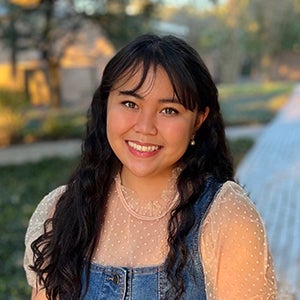Majors: Health Sciences and English
Minor: Medical Humanities
“English was not my first language,” said Alyssa Cahoy. “After my family and I immigrated to the US from the Philippines, I used to stay up until midnight reading books I borrowed from the library and looking up words I did not understand in the dictionary. Books were my first friends in the US, and I spent so much time poring through stories.”
This experience had such an impact on Alyssa that she came to Rice as a Humanities student with an interest in medicine and a plan to pursue the English major specialization in science, medicine and the environment. As she worked her way through medical school requirements, however, she discovered that the Kinesiology Department’s Health Sciences major was the perfect fit for her interests. “I realized that my curiosities resided in more systems-level, macroscopic understandings of healthcare and holistic frameworks of illness,” she said. “When I realized there was public health coursework at Rice, I did not hesitate to drop the pre-med track and declare a Health Sciences major instead.”
Currently, Alyssa is interning at the MD Anderson Cancer Center Health Disparities Department and Center for Community-Engaged Translational Research where she is helping to analyze and share the findings of a study designed to better understand cancer risk among Houston’s five largest Asian communities: Vietnamese, Indian, Chinese, Filipino and Pakistani.
“An estimated 70 percent of cancer cases are due to preventable risk factors (like tobacco use and obesity) caused by social and physical environments,” explained Alyssa. “Asian Americans — the fastest-growing racial/ethnic group in Houston, Texas and the United States — are particularly burdened by cancer. It is the leading cause of death among this group.”
Using a community-based participatory framework, researchers, healthcare providers, community members and organizations engaged in interviews and dialogues to create a shared understanding of cancer risk in Asian groups, which will help address an unmet need for community action and understanding around cancer.
“Having gotten to participate in this process, I am now more mindful of what it looks like to be co-producers of knowledge with community members and embody true partnership in all aspects of the research process,” Alyssa said.
Alyssa is also working as a project lead with the Medicine | Race | Democracy lab, an interdisciplinary Medical Humanities lab that examines healthcare beyond and between hospital settings to address medical racism. “I am currently conducting interviews with the Philippine Nurses Association of Metro Houston to excavate transgenerational immigrant relationships with medicine, as I am interested in gendered, diasporic Filipino identities,” she said.
This summer, Alyssa will be furthering her public health education in Atlanta as a Centers for Disease Control and Prevention Undergraduate Public Health Scholar. She will be helping conduct research on the implementation of HIV testing strategies and education interventions for Atlanta-based HBCUs (Historically Black Colleges and Universities) and other MSIs (minority-serving institutions).
As a rising senior, Alyssa is considering PhD programs in behavioral sciences and health communication. Her hope is to become a professor and advocate for robust healthcare infrastructure in immigrant and underserved communities. Through her work, she aims to emphasize the importance of public-facing communication and cross-disciplinary collaboration.

